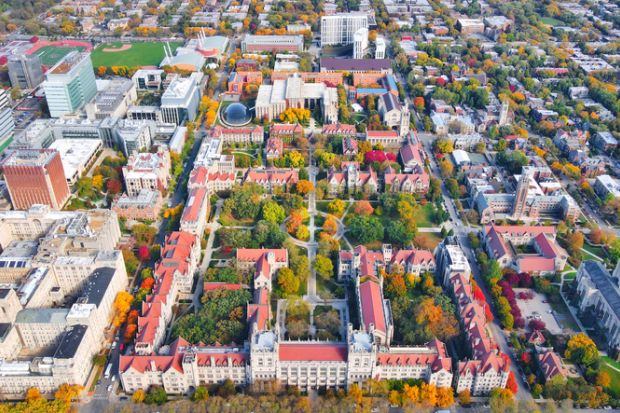The University of Chicago has agreed to settle a lawsuit accusing it of joining with other elite US institutions in a scheme that illegally reduced financial aid to needy students by billions of dollars.
Chicago, the first of the top-tier US universities to settle the year-old case, will pay $13.5 million (£10.5 million) and help plaintiffs build their case against the other institutions, which include most of the Ivy League.
The case is delivering a critical pushback against wealthy and privileged universities failing to prioritise the needs of their lower-income students, said one of the attorneys for the students, Robert Gilbert.
The 17 institutions have “colossal” endowments totalling more than $230 billion, and they should be using much more of it to fund scholarships for their “middle-class and working-class students”, Mr Gilbert said.
The University of Chicago said it was settling the case only to remove the distraction. “The university believes the plaintiffs’ claims are without merit,” it said in a brief statement. “We look forward to putting this matter behind us and continuing to focus our efforts on expanding access to a transformative undergraduate education.”
The plaintiffs, however, have been steadily compiling wins since filing the case early last year, including the Biden administration formally backing the case in court, and Congress refusing to renew a provision in federal law that helped enable the alleged conspiracy.
The complaint derives from the 1994 law known as Section 568, which generally lets colleges and universities cooperate on their financial aid formulas – usually a violation of federal antitrust law – if all the participating institutions admit all of their students without regard to their financial need.
But the plaintiffs said that most of the universities in the case continued to favour wealthier applicants in their admissions processes, and that the others knew that was happening, all in violation of the federal law.
The 17 institutions are among the nation’s best known, including Yale, Brown, Columbia, Duke and Notre Dame universities as well as the Massachusetts Institute of Technology, the California Institute of Technology and Dartmouth College.
More than 200,000 students and former students stand to receive restitution through the complaints, if successful.
The Biden administration last summer endorsed the case, and Congress last autumn let the decades-old 568 Antitrust Exemption expire.
The University of Chicago, as part of the settlement – which requires formal court approval – will “provide certain information to the plaintiffs, including documents and a witness interview, that plaintiffs expect will assist them in prosecuting their claims against the 16 universities that have not settled”, the plaintiffs’ attorneys said.
The case is part of a growing attempt to confront wealth-based inequalities in US higher education. A team of economists from Harvard and Brown universities last month issued an analysis confirming that top-ranked private US colleges and universities favour applicants from high-income families even when they have similar academic credentials.
Register to continue
Why register?
- Registration is free and only takes a moment
- Once registered, you can read 3 articles a month
- Sign up for our newsletter
Subscribe
Or subscribe for unlimited access to:
- Unlimited access to news, views, insights & reviews
- Digital editions
- Digital access to THE’s university and college rankings analysis
Already registered or a current subscriber? Login








